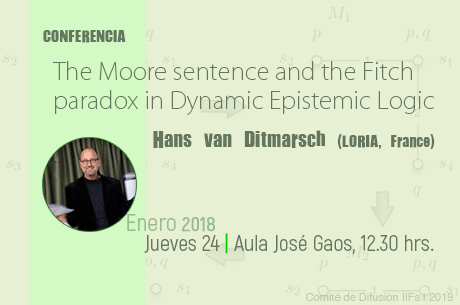CONFERENCIA: Hans van Ditmarsch
 |
|
CONFERENCIA Hans van Ditmarsch (LORIA, France)
Aula José Gaos, Instituto de Investigaciones Filosóficas, UNAM.
Abstract Dynamic epistemic logics are modal logics of knowledge (and belief) change, with modal epistemic operators to describe knowledge and dynamic modal operators to describe change of knowledge. In such a logic we can analyze the Moore-sentence: 'p is true but you don't know that p is true'; and also the Fitch-paradox: 'everything is knowable' is inconsistent with 'there is an unknown truth'.
The Moore sentence becomes false as a consequence of being announced. In this sense it is an 'unsuccessful' knowledge update. 'Success' is one of the requirements in AGM belief revision. The Fitch paradox can be analyzed in dynamic epistemic logic when we interpret 'knowable' as 'known after an announcement'. The Moore and Fitch themes are much related and hold for S5 knowledge and for KD45 (consistent) belief. Given the interpretation of 'successful' as 'known after its announcement' 'knowable' as 'known after an announcement', successful implies knowable. But knowable does not imply successful. All propositions are knowable in a more general sense: for each proposition, we can know whether it is true: either the proposition can become known or its negation can become known. In that sense, the Moore sentence is knowable!
Reading:
|

|
Aviso de privacidad



 Circuito Maestro Mario de la Cueva s/n, Ciudad Universitaria, C.P. 04510, Coyoacán México, CDMX
Circuito Maestro Mario de la Cueva s/n, Ciudad Universitaria, C.P. 04510, Coyoacán México, CDMX